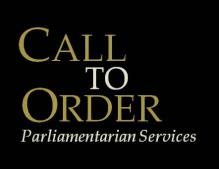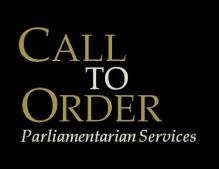In Mr. Smith Goes to Washington, the naïve Mr. Smith yields the Senate floor out of courtesy to a colleague, In doing so he loses his ability to debate on his legislation to prevent graft and corruption, Mr. Smith learned the hard way about the importance of knowing procedural rules. Officers and members of boards and and associations need to know the rules of order to achieve their goals and help their enterprises succeed. Our expertise includes:
- Meeting and Session Governance Services
- Presiding Officer Services
- Delegate Convention or Assembly Services
- Strategic Procedural Planning Services
- Bylaw Drafting, Review, and Revision Services
- Written Opinions Services
- Training Programs
Call out the sheriff! Legislators on the lamb!
Madison, WI -- Wisconsin Republican Governor Scott Walker needs to balance the budget, and he wants to do it by cutting spending and eliminating certain collective bargaining procedures of various government unions. His budget bill is being taken up by the Wisconsin State Senate where Republicans hold the majority of 19 to 14. But, fiscal bills require a quorum of three-fifths (60%) of the Senate members or 19.8 rounded to 20. Democrats have fled the state of Wisconsin to prevent a vote from being taken that they know they will lose.
The State Republican Senator Scott Fitzgerald made a motion for a call of the Senate. The motion for a call of the house in general parliamentary procedure requires, if adopted, the Sergeant at Arms lock to the doors of the assembly, after which a roll call is taken to find out who is present and more importantly who is absent without excuse. Those who are absent without excuse can be arrested and brought to the assembly. Generally, legislative bodies are the only types of assemblies that have the power to enforce a motion for a call of the the house. The Wisconsin State Senate has this authority. So now, 14 Democrat Senators are on the lamb and generally believed to be in Illinois.
The last time I can remember this happening was in Texas in 2004 when the Texas legislature was about to take a vote on the redistricting plan put together by the Republican controlled legislature. The Democrat members of the Texas legislature fled to Louisiana to prevent a quorum from being present and thereby stalling the plan from being implemented. (Needless to say, if the plan were implemented Democrats stood to lose some seats.) The Texas Rangers gathered up a posse to round up the fleeing legislators. You can't help but chuckle at the thought of a posse of Texas Rangers on horses chasing down those delinquent legislators!
The mere fact that a motion for a call of the house exists says something about us humans and the lengths that we're willing to go to have our way. Back at our nation's founding, one of the charges against King George in the Declaration of Independence was that "HE has called together Legislative Bodies at Places unusual, uncomfortable, and distant from the Depository of their public Records, for the sole Purpose of fatiguing them into Compliance with his Measures." Of course this was considered unfair. I wonder what the founders would say of the actions of either of the Wisconsin Democrats or the Texas Democrats?

© 2011 - 2015 Call To Order Parlimentarian Services
In the News
Independence Hall, Philadelphia,PA is where the Second Continental Congress debated and passed the Declaration of Independence, and where the Constitutional Convention debated and adoped the U.S. Constitution.

| Join Our Mailing List |
In Mr. Smith Goes to Washington, the naïve Mr. Smith yields the Senate floor out of courtesy to a colleague, In doing so he loses his ability to debate on his legislation to prevent graft and corruption, Mr. Smith learned the hard way about the importance of knowing procedural rules. Officers and members of boards and and associations need to know the rules of order to achieve their goals and help their enterprises succeed. Our expertise includes:
- Meeting and Session Governance Services
- Presiding Officer Services
- Delegate Convention or Assembly Services
- Strategic Procedural Planning Services
- Bylaw Drafting, Review, and Revision Services
- Written Opinions Services
- Training Programs
Activist Shareholders demand proxy access, but does it lead to Good Governance
The Wall Street Journal recently reported that Citigroup, Inc. will consider allowing a subset of shareholders the ability to nominate a limited number of board members. Known as “proxy access,” the rule would allow 20 investors to nominate up to 20% of the bank’s board. Proponents of proxy access argue that it will improve corporate governance, board accountability, and financial performance. Citibank is only one of a handful of companies that has proposed amending their bylaws to allow proxy access to shareholders. Opponents of proxy access argue that no evidence exists that proxy access improves governance or, most important, financial performance, and note further that proxy access has many pitfalls.
Currently, Securities and Exchange Commission regulations require boards of directors to issue proxy statements. Proxy statements contain notice of an annual meeting, nominations for members of the board of directors, resolutions that need to be voted and all related information to nominees and resolutions. Proxy statements also contain executive officer compensation information, other critical information, and the proxy card. The proxy card allows the stockowners the ability to cast votes for nominees and resolutions as proxies that are delivered to the board or secretary to be cast at the annual meeting.
Under SEC Rule 14a-8, shareholder nominations and proposals must be included in the proxy statement unless such nomination or proposals falls within a set of excluded matters or the proposal or nomination violates the rule in some way. The Wall Street Journal says that recently the SEC has changed its position on issuing “no-action letters” indicating that it will take no action against the company for refusing to include the nomination or proposal in the proxy statement. In the past the SEC has issued no-action letters for proxy access proposals as it had determined that such shareholder proposals fell within one of the exclusions. Not so any longer.
Most corporate bylaws allow shareholder nominations, but shareholders offering nominations or resolutions are responsible for distributing any voting materials as in any election. This is costly and time consuming. So shareholders seek access to the proxy statement, hence the term “proxy access,” in order to save the distribution costs.
In Business Round Table and Chamber of Commerce of the U.S. v. S.E.C., the U.S. Court of Appeals for the District of Columbia rejected an SEC regulation that would have required proxy access across the boards. The opinion describes the arguments in great detail, but the short version is that the SEC failed to demonstrate that the benefits outweighed the costs. The Court stated that the benefits to granting shareholder proxy access are indeterminate and the costs to the company is significant. Further, proxy access would make a company vulnerable to abuse by union and state pension funds in that nominees from these groups, if elected, may seek concessions on contracts.
This story will continue to unfold as a corporate governance issue, and time will only tell whether proxy access improves corporate governance, accountability, and shareholder value.

In the News
Independence Hall, Philadelphia,PA is where the Second Continental Congress debated and passed the Declaration of Independence, and where the Constitutional Convention debated and adoped the U.S. Constitution.
